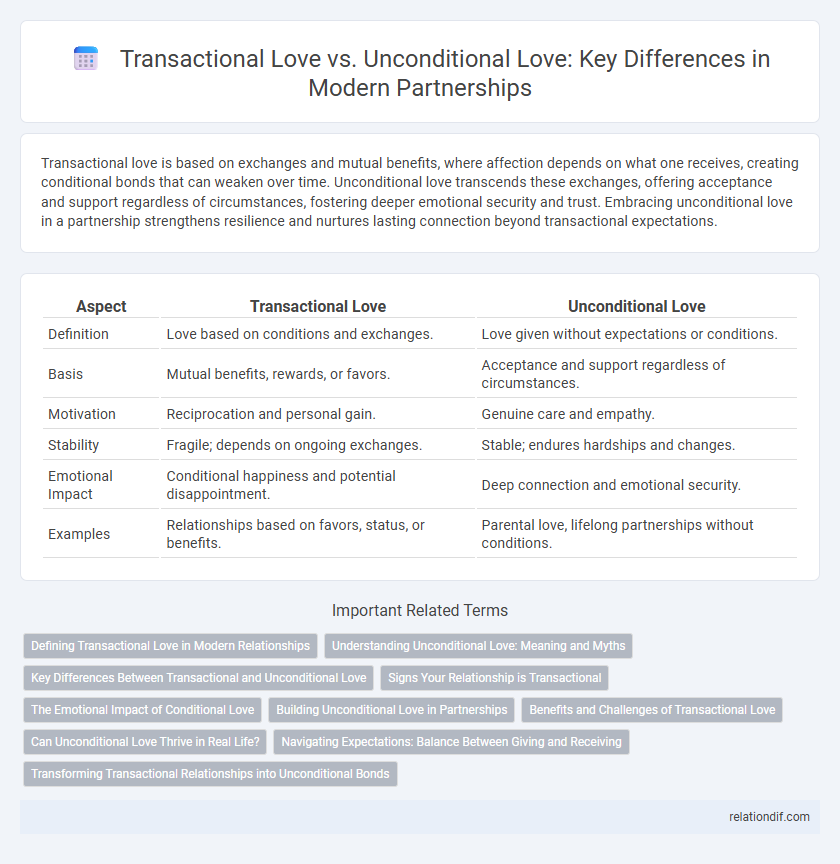Transactional love is based on exchanges and mutual benefits, where affection depends on what one receives, creating conditional bonds that can weaken over time. Unconditional love transcends these exchanges, offering acceptance and support regardless of circumstances, fostering deeper emotional security and trust. Embracing unconditional love in a partnership strengthens resilience and nurtures lasting connection beyond transactional expectations.
Table of Comparison
| Aspect | Transactional Love | Unconditional Love |
|---|---|---|
| Definition | Love based on conditions and exchanges. | Love given without expectations or conditions. |
| Basis | Mutual benefits, rewards, or favors. | Acceptance and support regardless of circumstances. |
| Motivation | Reciprocation and personal gain. | Genuine care and empathy. |
| Stability | Fragile; depends on ongoing exchanges. | Stable; endures hardships and changes. |
| Emotional Impact | Conditional happiness and potential disappointment. | Deep connection and emotional security. |
| Examples | Relationships based on favors, status, or benefits. | Parental love, lifelong partnerships without conditions. |
Defining Transactional Love in Modern Relationships
Transactional love in modern relationships is defined by exchanges where affection and commitment are contingent upon specific behaviors or benefits, often resembling a market-driven dynamic. This form of love emphasizes mutual gains, where partners expect rewards proportional to their contributions or sacrifices. Understanding transactional love highlights the contrast with unconditional love, which prioritizes acceptance and support regardless of conditions or outcomes.
Understanding Unconditional Love: Meaning and Myths
Unconditional love in partnerships refers to a deep, unwavering affection that persists without expecting anything in return or attaching conditions to the relationship. Common myths suggest it means ignoring flaws or tolerating harmful behavior, but true unconditional love involves accepting imperfection while fostering mutual respect and growth. Understanding these distinctions helps partners build a resilient bond based on empathy and authentic connection rather than transactional exchanges.
Key Differences Between Transactional and Unconditional Love
Transactional love is characterized by exchanges and conditions, where affection and support depend on specific actions or benefits, often leading to a tit-for-tat dynamic. Unconditional love thrives on acceptance and commitment regardless of circumstances, providing emotional security and fostering genuine connection without expecting reciprocity. Key differences lie in motivation and sustainability: transactional love is fragile and contingent, whereas unconditional love is enduring and freely given.
Signs Your Relationship is Transactional
Signs your relationship is transactional include a constant tally of favors exchanged, where love feels conditional and dependent on what each partner gives or receives. Communication often centers around negotiations or agreements rather than emotional support and genuine connection. When affection is measured by material gifts or specific actions, rather than mutual care and understanding, it indicates a transactional dynamic rather than unconditional love.
The Emotional Impact of Conditional Love
Transactional love creates emotional instability as partners constantly evaluate their worth based on benefits received, leading to insecurity and anxiety. Unconditional love fosters emotional safety and trust, allowing individuals to express vulnerability without fear of rejection. The emotional impact of conditional love often results in feelings of inadequacy, resentment, and a diminished sense of self-worth within the partnership.
Building Unconditional Love in Partnerships
Transactional love emphasizes exchanges and conditions, often leading to unstable relationships, while unconditional love fosters trust and long-term commitment by embracing flaws and growth. Building unconditional love in partnerships requires consistent empathy, open communication, and mutual support, which create a strong emotional foundation. This approach enhances relationship resilience, satisfaction, and deepens intimacy beyond superficial exchanges.
Benefits and Challenges of Transactional Love
Transactional love offers clear benefits by establishing mutual expectations and fostering a sense of security through defined exchanges, which can enhance relationship stability and satisfaction. However, challenges arise when love becomes conditional, potentially leading to emotional dissatisfaction, lack of genuine intimacy, and increased vulnerability to conflicts if expectations are unmet. This dynamic can hinder long-term trust and emotional growth within partnerships, limiting deeper connection and resilience.
Can Unconditional Love Thrive in Real Life?
Unconditional love in partnerships transcends transactional exchanges by fostering deep emotional security and trust without expecting specific returns. Research indicates that couples practicing unconditional love experience greater relationship satisfaction, resilience, and long-term stability. However, sustaining unconditional love requires consistent empathy, communication, and mutual respect to thrive in real-life challenges.
Navigating Expectations: Balance Between Giving and Receiving
Navigating expectations within partnerships requires a delicate balance between transactional love, where affection is exchanged based on conditions, and unconditional love, which fosters acceptance without strings attached. Successful relationships thrive when partners openly communicate needs, ensuring mutual giving and receiving that honors both individual boundaries and shared goals. This equilibrium prevents resentment and strengthens emotional intimacy, promoting sustainable connection and trust.
Transforming Transactional Relationships into Unconditional Bonds
Transactional love is often based on exchanges and conditions, limiting emotional depth and long-term satisfaction in partnerships. Transforming transactional relationships into unconditional bonds requires cultivating trust, empathy, and genuine care without expecting specific returns. This shift fosters lasting intimacy and resilience, deepening the connection beyond material or superficial exchanges.
Transactional Love vs Unconditional Love Infographic

 relationdif.com
relationdif.com